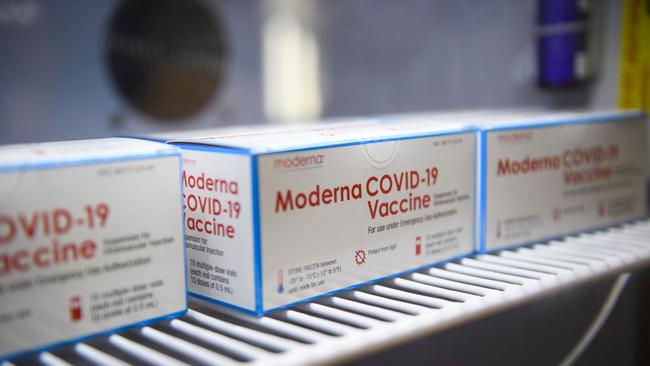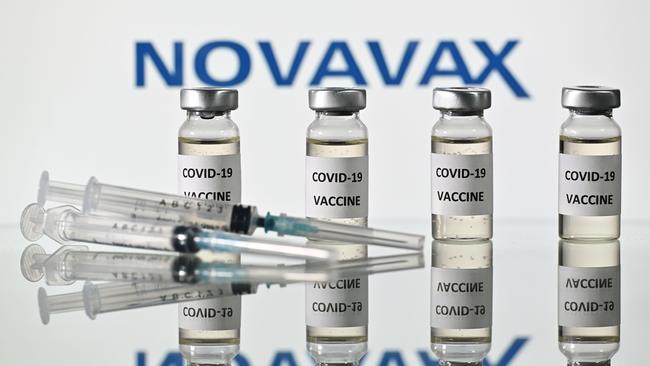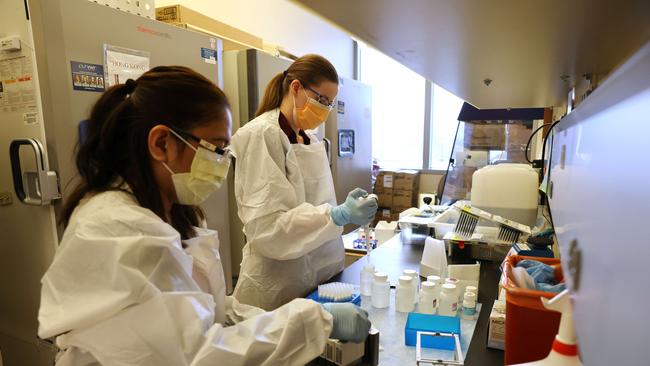New Covid vaccines bound for Australia and when I can get them
Two new Covid jabs are expected to arrive in Australia this year in a boost to the nation’s vaccine rollout. This is how they work.
Coronavirus
Don't miss out on the headlines from Coronavirus. Followed categories will be added to My News.
These are the next vaccines that are expected to hit Australian shores as we continue to get more Pfizer and AstraZeneca vaccines.
MODERNA
The Australian Government has secured 25 million doses of the Moderna COVID-19 vaccine. The first 10 million doses were expected to arrive in the latter part of the year but projections look to fall short of that.
Government projections estimate between 87,000 and 125,000 doses of Moderna will be available in September and between 430,000 and 615,000 available in October to December 2021.
Like Pfizer, Moderna is a messenger RNA (mRNA) vaccine for Covid.
Once the mRNA enters the body’s cells, the cells use the recipe to make the spike protein from the coronavirus which allows the immune cells to start making antibodies against it. It does not and cannot alter DNA.
Moderna also has a variant-specific version to address longer term immunity for emerging strains like Delta. The government has ordered 15 million doses of this version, as part of its overall purchase, with delivery expected in the first half of 2022.

Moderna has said test-tube studies using blood samples from vaccinated people show its current jab is still highly effective against the Delta variant.
The vaccine requires two shots, 28 days apart.
Although approved by the UK, the EU, Canada and the USA, the Therapeutic Goods Administration (TGA) granted provisional determination last month and supply will only commence should the vaccine be approved as safe and effective, which is expected given its safety profile in other countries.
The Moderna vaccine has shown an overall vaccine efficacy against symptomatic Covid of 94.1 per cent, and 100 per cent efficacy against severe Covid.
It has also shown strong protection of 90 per cent efficacy against COVID-19 for at least six months after the second dose.
NOVAVAX
Novavax is a vaccine still in Phase 3 development. If it is proven safe and effective by the TGA, it will be available in Australia later in 2021. The government has ordered 51 million doses.
Large-scale Phase 3 clinical trials have been conducted in the United Kingdom, and South Africa, and there are ongoing trials in the United States and Mexico, with up to 30,000 volunteers. These trials have demonstrated that the Novavax vaccine is effective at preventing symptomatic COVID-19.
Novavax uses a traditional vaccine technology by using purified pieces of the actual SARS-CoV-2 coronavirus spike protein to spur the production of antibodies. Two doses are required 21 days apart.

A Phase 3 paediatric trial in the United States is also testing of up to 3000 adolescents aged 12-17 years as well.
Novavax says its vaccine is most effective against the original coronavirus strain, as well as the Alpha strain that was first detected in the UK but less effective on the Beta strain originally out of South Africa. The company has not conducted studies on the Delta variant.
Side effects following the Novavax vaccine have been generally mild to moderate, and short-lived.
CURRENT TRIALS OF MIXING AND MATCHING VACCINES
Combining different types of Covid-19 vaccines may offer a better immune response and is currently being trialled in six countries around the world.
Spain was the first country to study those who had one AstraZeneca shot, followed up with the Pfizer vaccine eight to 12 weeks after. It found the approach produced a higher antibody response.
Subsequent German studies reported that the mix and match regimen elicited an immune response as good as or better than two shots of Pfizer.
The United Kingdom Com-COV study has just released its findings into the combination regime. Mixed schedules of Pfizer, followed by AstraZeneca and AstraZeneca, followed by Pfizer both induced high doses of antibodies when given four weeks apart.
“Evidence from the German non-randomised studies suggest that the immune response is the same or better than having the same type of vaccine for both first and second doses,” Professor Terry Nolan, head of the Vaccine and Immunisation Research Group at the Doherty Institute, said.
While the World Health Organisation is cautious on the idea of mixing and matching, our experts assess the possibilities:
Which combination is best?
Which vaccine works best before or after was also analysed in the Com-COV study.
“The UK Government-funded study using a proper randomised controlled clinical trial confirmed the German results but shows a very strong immune response if the AstraZeneca vaccine is given first then followed by the Pfizer vaccine four weeks later, and not nearly as strong if given in the reverse order, that is Pfizer first, followed by AstraZeneca,” Prof Nolan said.
Side effects of the mixed regime were slightly higher but of the moderate kind.
“They showed a moderate increase in rates of minor events like injection site soreness and feeling off colour and very transient tiredness with a mixed schedule. A further stage of the UK study is looking not just at Pfizer and AstraZeneca vaccines, but also at Moderna and Novavax Covid vaccines, both of which are being purchased by the Australian Government,” Prof Nolan said.
“Theoretically, we could expect both improved protection, longer lasting immunity, and possibly better protection against variant strains because the immune responses were so strong. “But while very likely, this is not certain, and the new data following use of mixed schedules in the population will answer only some of these questions (e.g. actual protection against delta and other variant strains, and any possible longer lasting immunity will take time to assess).”
Professor Matthew Snape, Associate Professor in Paediatrics and Vaccinology at the University of Oxford, and Chief Investigator on the UK Com-COV study said mix and match allowed for flexibility in vaccine rollouts.
“The results show that when given at a four-week interval both mixed schedules induce an immune response that is above the threshold set by the standard schedule of the AstraZeneca vaccine,” Prof Snape said in The Lancet medical journal.
The results for a 12-week interval between different shots are yet to be released.
Can I get the combination in Australia?
Professor of infectious diseases epidemiology at Monash University and Chair of the Advisory Committee for Vaccines Allen Cheng said the combination approach was not routinely offered in Australia.
“There are several studies being done into getting different types of vaccines, but at the moment these are not routinely recommended. The main exception is if someone has a serious complication after the first dose (eg anaphylaxis, or severe allergy), then they can’t get the same vaccine again. The other exception is if someone has received a vaccine overseas that yet isn’t available in Australia (eg Moderna, or Sinovac). But these situations are both uncommon, and you’ll need to discuss this with a specialist vaccine provider,” Prof Cheng said.
“The other concern that people have is about the clotting complication (TTS) and whether they should have Pfizer instead of AstraZeneca as their second dose.
“This isn’t currently recommended, as the risk of clotting after the second dose is much lower than after the first dose (in the UK, there have been 36 cases reported after second doses, with an estimated risk of less than 2 cases per million second doses).”
Is it safe?
The current studies into combination regimes have also been much smaller than original safety studies.
“It should be noted that the clinical trials that used two doses of the same vaccine (Pfizer, AstraZeneca or others) have generally tested their vaccines on tens of thousands of participants; these studies looking at mixed schedules have only been done on a few hundred participants. Thus, we don’t yet know if mixed schedules are more effective in preventing infection, or if there are any rare but serious side effects associated with mixed schedules,” Prof Cheng said.
For this reason the World Health Organisation has issued a caution on the practice.

How would an approval for a mix and match happen?
What combinations will be available and or recommended will depend on advice from the Australian Technical Advisory Group on Immunisation (ATAGI), Prof Cheng said.
“In general, this wouldn’t be a TGA decision – they usually assess applications from the vaccine manufacturers, and it is unlikely that a vaccine manufacturer is going to put in an application to reduce use of their vaccine. However, this doesn’t prevent ATAGI recommending mixed schedules if the data support it in the future,” Prof Cheng said.
Will we all need a booster (3rd shot) with another kind of vaccine?
“We still don’t know how long the protection lasts, or whether a booster might be required to enhance protection against variants. UK data suggest that both AstraZeneca and Pfizer look like they hold up quite well against delta variant infections (which are becoming common globally) as (they do for) for alpha variant infections,” Prof Cheng said.
Canada is currently using both the mRNA vaccines, Moderna and Pfizer “interchangeably when a second dose of the same vaccine is not readily available” and Canada’s National Advisory Committee on Immunisation also recommended that “anyone who got AstraZeneca for their first dose preferentially get an mRNA shot for their second dose, based on preliminary research showing a stronger immune response from mixing the two vaccine types than from taking two shots of AstraZeneca as well as the fact that the mRNA vaccines do not carry the same risk of rare blood clots associated with AstraZeneca.”
By the end of the year Australia will have supplies of Moderna and Novavax – if approved by the Therapeutics Goods Administration – and more Pfizer. This is in addition to our existing, locally-produced supplies of AstraZeneca.




